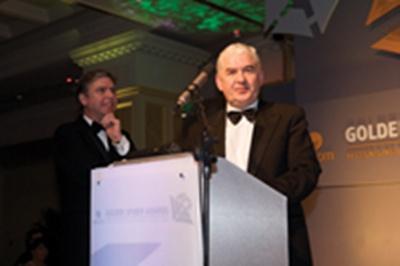New HSE boss and cancer chief appointed

The roles of HSE CEO and cancer chief have recently been filled by Cathal Magee and Susan O'Reilly, whose combined experience indicates interesting times ahead for the health service. By Sara Burke.
Two of the most senior health service posts have been filled in the last couple of weeks. Cathal Magee is the new HSE CEO, while Canadian Susan O’Reilly is the new cancer chief. So what's the word on the new HSE managers?
Magee is a married father of four from Cavan with a BA & MSc in management and a keen interest in sports, particularly GAA, soccer and rugby. He describes himself as a hard working business man but also a family man. He has had a long, successful, varied career, and he has earned enough money never to need to work again, but he appears to be taking on this role out of commitment to public service.
(Picture: Cathal Magee, new CEO of the HSE)
Magee is a non-executive director of both EBS and VHI, the latter role he will presumably have to give up. He was acting CEO of Eircom until February of this year when Paul Donovan was appointed. Before that he was head of retail at Eircom - in total he worked for the company for 15 years, prior to which he worked for the National Australia Bank Group in UK and Ireland. His acheivements in Eircom include reshaping the company's cost base, carrying out very successful negotiations with unions and successfully opposing a cheap buy-out.
He started off his career in the old health boards, joining the North Western Health Board in 1972 as a clerical officer in the Finance Department. He was promoted quickly to various jobs before moving to the Western Health Board (WHB) as Industrial Relations Manager. Colleagues from the time remember him as ‘blazing a trail’ - championing community services in the north west which subsequently have always been better in these areas. Specifically he is remembered for work with community nursing, OT, physios, speech and language therapies. After his time in the WHB he went to Bord na Mona as director of HR and business restructuring.
In terms of management style, he is described as ‘very pleasant’, ‘tough’, a ‘straight talker’, and a man ‘up for the challenge’. He had a strong reputation for building relationships and this is most evident in the restructuring he did in Eircom through pragmatic negotiations with the unions. One union representative says that Magee knows how to strike a deal and how to make it happen. He is not interested in unnecessary conflict - although tough, he is happy to delegate and give autonomy to employees. There is speculation that with Magee in charge there will be a much more streamlined HSE.
One of the biggest challenges Magee faces is how to provide quality public health and social care services with a declining budget and fewer staff to a growing, more demanding population. He will also have to deal with the issues of credibility, trust and transparency which have been very evident in the last few weeks during the debacle over the number of children who have died while in the care of the state. HSE integrity is at an all-time low, both politically and publicly, so real leadership is needed to regain that trust and for citizens to believe that the HSE is a credible, reliable institution.
As part of this, the HSE will need to go about its work in a very different way, avoiding what Emily O’Reilly has recently described as a culture of secrecy and defensiveness.The structures of the HSe have been changed so many times that changing them again may not be the solution, but streamlining and making it clearer as to who is responsible for what is a very important task on hand for the new HSE CEO. The failure to do this in the first five years of the HSE is evident in the child death fiasco and the recent acknowledgment by Brendan Drumm that it will be another two yeas before child welfare/protection services are standardised.
If the Croke Park deal is passed, the whole public service landscape will be up for ‘radical change’. Achieving the change outlined in the deal will require a very different way of working. For example, instead of closing beds or wards, the HSE will need to get rid of other inefficiencies in the system. It seems that if anyone is up for that ‘radical reform’ in the health service then Cathal Magee might well be the man for the job.
Susan O’Reilly, the new cancer chief, has a more than impressive CV. She is extremely well-qualified and has been described as being ‘at the top of her game’. Currently she is Vice President of Cancer Care in British Columbia, Canada where she is responsible for strategy, financial planning and delivery of both medical and operational components of all clinical programmes for cancer patients in the five Cancer Agency centres. She is the Clinical Professor of Medical Oncology for past 13 years.
Originally from Wales, she studied medicine in Trinity and trained in Dublin before moving on to specialise in oncology in Vancouver. She is a Fellow of the Royal College of Physicians of Ireland and of the Royal College of Physicians and Surgeons of Canada and her current interests include the provision of timely, high quality cancer control services and innovative programs in complex health care systems.
She will take up her new appointment in early September, while Cathal Magee will also take up his new role then.
